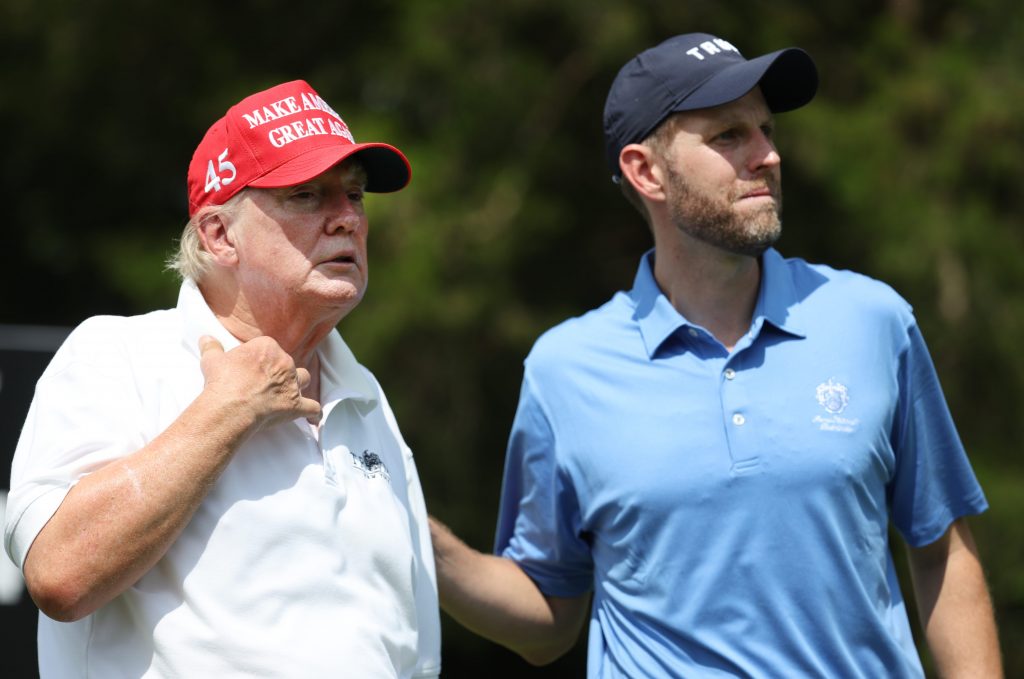- Eric Trump said on Wednesday that the Republican party should be called "the Trump party."
- He referred to his father's endorsement record as a sign of his influence in the GOP.
- He said Donald Trump had "redefined" the Republican party and how it operates.
Eric Trump said on Wednesday that his father, former President Donald Trump, is the key defining feature of the GOP and that the Republican party should be known as the "Trump party."
He made the comments while speaking with Eric Bolling on Newsmax as they discussed Rep. Liz Cheney's recent loss in the Wyoming GOP primary election to Trump-backed lawyer Harriet Hageman.
"Any question, Eric, that the Republican party is the party of Trump?" Bolling asked him.
"There's no question. I mean, it's not even the Republican party, I'd say it's actually the Trump party," Trump said, referencing his father's endorsement record. Per Ballotpedia, the elder Trump's endorsement record stands at 92%, with 183 victories and 17 defeats.
"My father has really redefined what the party is, how the party speaks to its constituents," Eric Trump told Newsmax.
He said that his father had "literally brought in a whole new party that stands for something totally different than the RINO class of the Republican party ever stood for."
RINO, which stands for "Republican in name only," is a term commonly used in Trumpworld as an insult to GOP lawmakers who do not support Trump.
Trump also gloated over the margin by which Cheney — the daughter of former Vice President Dick Cheney — lost the Wyoming Republican primary, saying that his father had "killed another political dynasty."
"He first killed the Bushes and then he killed the Clintons. Last night, he killed the Cheneys. He's been RINO-hunting ever since he got into politics," he said.
Hageman's win over Cheney on Tuesday, in which the lawyer received 66.3% of the vote, marked the largest victory margin that a Trump-backed candidate has earned.
The former president's endorsement has been key to helping several candidates, such as J.D. Vance and Dr. Mehmet Oz, win their respective GOP primaries.
However, The New York Times reported that the elder Trump also has a track record of supporting candidates who run unopposed or against poorly-funded opponents. The former president sometimes also waits to choose a candidate only after they begin emerging as the likely winner, per the outlet.
Some Trump-backed candidates have also been defeated by large margins, such as gubernatorial hopeful David Perdue, who lost his Georgia primary to the incumbent Gov. Brian Kemp. Georgia Secretary of State Brad Raffensperger also fended off his Trump-endorsed opponent, Rep. Jody Hice, by a healthy margin.
The resounding losses of some of Donald Trump's favored candidates have caused some to question the true power of his endorsements. Moreover, Trump's popularity amongst those thought to be his loyal supporters also appears to be dwindling amid a bevy of lawsuits and investigations.
For instance, former Vice President Mike Pence has increasingly voiced differing opinions from those circulating in Trumpworld. He recently condemned the far-right's calls to defund the FBI following the agency's raid on Trump's Mar-a-Lago residence last Monday.
Similarly, Maryland Governor Larry Hogan claimed last month that the former president's influence has "decreased dramatically" and pointed to five GOP governors who have withstood Trump's attacks.
Even Alex Jones, a conspiracy theorist once loyal to the former president, has said he would no longer "pigheadedly" support Trump and is now backing Florida Gov. Ron DeSantis instead.
Despite this turnaround, Trump continues to chart high in polls. One recent survey by Politico found that 57% of registered voters would choose the former president if he were to run for re-election in 2024. Another poll by CBS in March found that 52% of polled Republicans wanted their midterm candidates to talk about being loyal to Trump.
